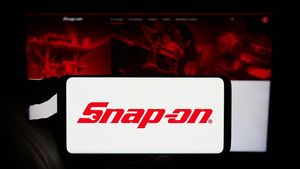Financial News
After Inking Major Supply Deals With Walmart And Costco, Short Sellers Of BranchOut Food, Inc. Stock Could Be Ripe To Squeeze ($BOF)
BranchOut Food, Inc. (NASDAQ: BOF) went public last Friday. Since then, shorts have been feasting on shares, with estimates from investor discussion pointing toward FINRA records indicating anywhere from 46% to 114% of BOF shares are sold short. Of course, blogs discussing that "position" may or may not be exaggerated. But it doesn't take a stock guru to know that with only about 1.19 million shares outstanding, there could indeed be some trading floor shenanigans. In fact, it's more than likely; it's probable. Here's why.
First, BOF made two significant announcements showing itself shifting into hyper-speed growth. On Tuesday, they announced inking a deal with Walmart (NYSE: WMT) to supply 2,250 stores with its innovative dehydrated food products. On Wednesday, they noted its new deal with Costco (NASDAQ: COST). Both are accretive, revenue-generating deals. And if shorts attacked the stock, considering the BOF revenues in play and tiny share float, they could soon find themselves cornered. Here's why the BOF news matters.
Don't Ignore The Obvious
Assuming WMT purchases $1000 worth of products for each store, BOF would benefit from receivables of $2.25 million. Estimating an initial purchase of $1,000 is warranted, knowing that it likely amounts to about 250 bags of product, maybe more, maybe less. Still, it's in that ballpark; Walmart doesn't play small ball. So, assuming that number and success in marketing, which BOF intends to do heavily, extrapolating that deal to 12 months, again, WMT typically works in long-term contracts; BOF, from its WMT contract alone, could generate at a minimum roughly $27 million. Then, assuming a 30% gross margin, probably a low estimate, BOF could be accounting for gross profits of approximately $8.1 million. That's for the WMT deal. Remember, there's another deal to factor into the equation.
On Wednesday, BOF announced a supply deal commitment with Costco, highlighting terms to serve Costco's Los Angeles region. The Los Angeles region commitment builds on an already established working relationship with Costco, marking the third product and fourth Costco region that BranchOut Food is selling into. They are already serving the Pacific Northwest, Northern California, and Texas. Reading between the lines, COST likes the sell-through rate of BOF products, or why expand the agreement? That sheds light on the probability of BOF foods doing well in Walmart.
So, with two significant deals in the books and more likely in the queue, why are people shorting the stock, especially one like BOF that has only 1.19 million shares outstanding? The best guess, traders are speculating on a near-term capital raise. It's possible but less probable than many may think. Yes, it takes cash to create the inventories needed to supply those two announced deals. But remember, BOF is no newbie to the business. While its IPO is fresh, they have been manufacturing and providing for customers far longer. Moreover, the funds raised last week are ample to cover a colossal product run. Thus, shorting on that premise is risky.
A Risky Proposition
Frankly, shorting BOF for any reason at this point comes with significant risks, regulatory and financial. Financially, the consequences are obvious. If shorts cover at higher prices, they lose money. And with the listed share count and float, short positions trying to re-purchase over 1.19 million shares, assuming blogs about the 114% short position are accurate, can be a challenging proposition. The buying interest would almost certainly send the BOF process soaring. That's covering the traditional short position.
Looking at things differently, arguments can be made that "naked" shorts are the culprit. Market makers have the advantage of selling short and getting some leeway before flattening their books. It's a common practice, and many have less of a sense of urgency, right or wrong, to cover their trades. But their lack of performance doesn't mean they have unlimited time to square their books. The SEC has implemented and enforced, and continues to do so, policies to keep markets fair and balanced. Reg SHO is one tool.
Compliance With Reg SHO
Compliance with Regulation SHO began on January 3, 2005, adopted to update short sale regulation in light of numerous market developments since short sale regulation was first adopted in 1938. It specifically addresses concerns regarding persistent failures to deliver and potentially abusive "naked" short selling arising from concerns about failures to deliver and to promote market stability and preserve investor confidence. The Commission has amended Regulation SHO several times since 2005 to eliminate certain exceptions, strengthen specific requirements and reintroduce the price test restriction.
As initially adopted, Regulation SHO included two major exceptions to the close-out requirement: the "grandfather" provision and the "options market maker" exception. Due to continued concerns about failures to deliver and the fact that the Commission continued to observe particular securities with failure to deliver positions that were not being closed out under then existing requirements, in 2007, the Commission eliminated the "grandfather" provision. In 2008 the Commission eliminated the "options market maker" exception.
In addition, the Commission adopted temporary Rule 204T in 2008 and final Rule 204 in 2009, which strengthened further the close-out requirements of Regulation SHO by applying close-out requirements to failures to deliver resulting from sales of all equity securities and reducing the time frame within which failures to deliver must be closed out.
Then, in 2010, the Commission adopted Rule 201 of Regulation SHO. Rule 201 restricts the price at which short sales may be effected when a stock has experienced significant downward price pressure. Rule 201 is designed to prevent short selling, including potentially manipulative or abusive short selling, from driving down further the price of a security that has already experienced a significant intra-day price decline and to facilitate the ability of long sellers to sell first upon such a decline. Regulation SHO's four general requirements are straightforward and are available to read through a simple Google (NASDAQ: GOOG) search. Based on the rules, there are consequences.
As a result of compliance with Rule 204, generally, a participant's failure to deliver positions will not remain for 13 consecutive settlement days if, for whatever reason, a participant of a registered clearing agency has a fail to deliver a position at a registered clearing agency in a threshold security for 13 consecutive settlement days, the requirement to close-out such position under Rule 203(b)(3) remains in effect. In other words, the short window of open season on BOF stock is starting to close. By July 1, 2023, BOF shares, considering the position to be covered, are likely higher than lower. (https://www.sec.gov/investor/pubs/regsho.htm)
Shorting While "Naked"
The other case of short selling is the "naked" side. In a "naked" short sale, the seller does not borrow or arrange to borrow the securities in time to deliver to the buyer within the standard settlement period. As a result, the seller fails to deliver securities to the buyer when delivery is due (known as a "failure to deliver" or "fail"). Failures to deliver may result from either a short or a long sale. Notably, there may be legitimate reasons for a failure to deliver.
For example, human or mechanical errors or processing delays can result from transferring securities in physical certificates rather than book-entry forms, thus causing a failure to deliver on a long sale within the standard settlement period. Also, a failure may result from "naked" short selling. For example, market makers who sell short, thinly traded, illiquid stock in response to customer demand may encounter difficulty in obtaining securities when the time for delivery arrives.
Here's the rub and the issue providing some breathing room for the market makers. "Naked" short selling is not necessarily a violation of the federal securities laws or the Commission's rules. In certain circumstances, "naked" short selling contributes to market liquidity.
For example, broker-dealers that make a market in a security generally stand ready to buy and sell the security on a regular and continuous basis at a publicly quoted price, even when there are no other buyers or sellers. Thus, market makers must sell a security to a buyer even when there are temporary shortages of that issuance. This may occur if there is a sudden surge in buying interest in that security or if few investors are selling the security at that time. Because it may take a market maker considerable time to purchase or arrange to borrow the security, a market maker engaged in bonafide market making, particularly in a fast-moving market, may need to sell the security short without having arranged to borrow shares. This is especially true for market makers in thinly traded, illiquid stocks, as few shares may be available to purchase or borrow at a given time. Still, it's not the wild west of trading anymore.
Failures to deliver that persist for an extended time may result in a sizeable unfulfilled delivery obligation at the clearing agency where trades are settled. Regulation SHO is intended to reduce the number of potential failures to deliver and limit the time in which a broker can permit a failure to deliver to persist. For instance, as explained above, Regulation SHO generally requires firms that clear and settle trades to close out a failure to deliver resulting from a short sale by the beginning of regular trading hours on the settlement day following the trade date. In other words, the window is closing on the "naked" as well. (https://www.sec.gov/investor/pubs/regsho.htm)
The Path Of Least Resistance Primed For Higher
So, what's the bottom line? Investors "LONG" BOF stock have an inherent long-term advantage. And those short BOF stock may be playing with scorching hot fire. Remember, the deals announced are accretive, revenue-generating deals that will impact the company's growth, ability to score additional big-box contracts, and bottom line. All for the positive.
Still, it's important to recognize that short-term pain, while indeed excruciating at times, is just a part of trading. And while it's not the envy of places for traders to reside, when it results from companies ideally positioned for significant growth, like BranchOut Food, it can be short-lived and benefit from rocket fuel being put in its tanks when short positions unwind.
In BOF's case, the tiny float creates a formidable contender for shorts to cover. Their worst fears are that BOF will provide more good news to the markets allowing more shares to get into tighter grips. Many think that's the likely course, which inevitably makes the BOF shares path of resistance higher. In this case, supported by news, appreciably so.
Disclaimers: Trendingsmallcaps.com (TSM) is responsible for the production and distribution of this content. TSM is not operated by a licensed broker, a dealer, or a registered investment adviser. It should be expressly understood that under no circumstances does any information published herein represent a recommendation to buy or sell a security. Our reports/releases are a commercial advertisement and are for general information purposes ONLY. We are engaged in the business of marketing and advertising companies for monetary compensation. Never invest in any stock featured on our site or emails unless you can afford to lose your entire investment. The information made available by TSM is not intended to be, nor does it constitute, investment advice or recommendations. The contributors may buy and sell securities before and after any particular article, report and publication. In no event shall TSM be liable to any member, guest or third party for any damages of any kind arising out of the use of any content or other material published or made available by TSM, including, without limitation, any investment losses, lost profits, lost opportunity, special, incidental, indirect, consequential or punitive damages. Past performance is a poor indicator of future performance. The information in this video, article, and in its related newsletters, is not intended to be, nor does it constitute, investment advice or recommendations. TSM strongly urges you conduct a complete and independent investigation of the respective companies and consideration of all pertinent risks. Readers are advised to review SEC periodic reports: Forms 10-Q, 10K, Form 8-K, insider reports, Forms 3, 4, 5 Schedule 13D. For some content, TSM, its authors, contributors, or its agents, may be compensated for preparing research, video graphics, and editorial content. Trendingsmallcaps.com has been compensated up to ten-thousand-dollars cash via wire transfer by a third party to produce and syndicate content for BranchOut Food, Inc. for a period of one month. As part of that content, readers, subscribers, and website viewers, are expected to read the full disclaimers and financial disclosures statement that can be found on our website. The Private Securities Litigation Reform Act of 1995 provides investors a safe harbor in regard to forward-looking statements. Any statements that express or involve discussions with respect to predictions, expectations, beliefs, plans, projections, objectives, goals, assumptions or future events or performance are not statements of historical fact may be forward looking statements. Forward looking statements are based on expectations, estimates, and projections at the time the statements are made that involve a number of risks and uncertainties which could cause actual results or events to differ materially from those presently anticipated. Forward looking statements in this action may be identified through use of words such as projects, foresee, expects, will, anticipates, estimates, believes, understands, or that by statements indicating certain actions & quote; may, could, or might occur. Understand there is no guarantee past performance will be indicative of future results. Investing in micro-cap and growth securities is highly speculative and carries an extremely high degree of risk. It is possible that an investors investment may be lost or impaired due to the speculative nature of the companies profiled.
Media Contact
Company Name: Trending Smallcaps
Contact Person: Jeffrey Allen
Email: Send Email
Country: United States
Website: http://trendingsmallcaps.com/
More News
View More




Recent Quotes
View More
Quotes delayed at least 20 minutes.
By accessing this page, you agree to the Privacy Policy and Terms Of Service.




